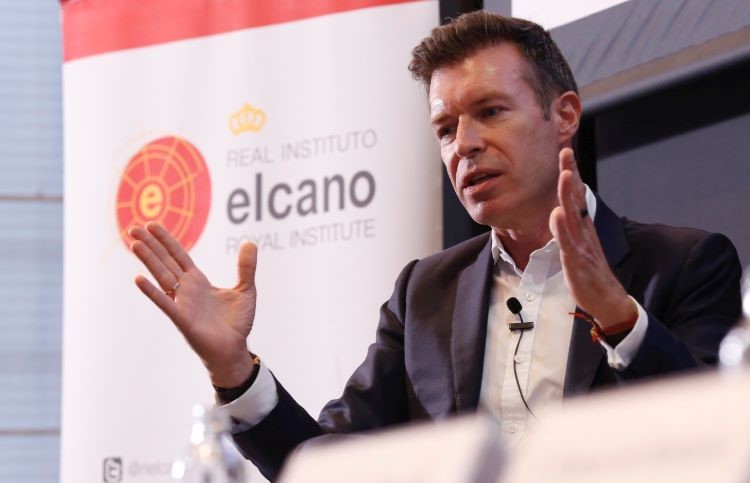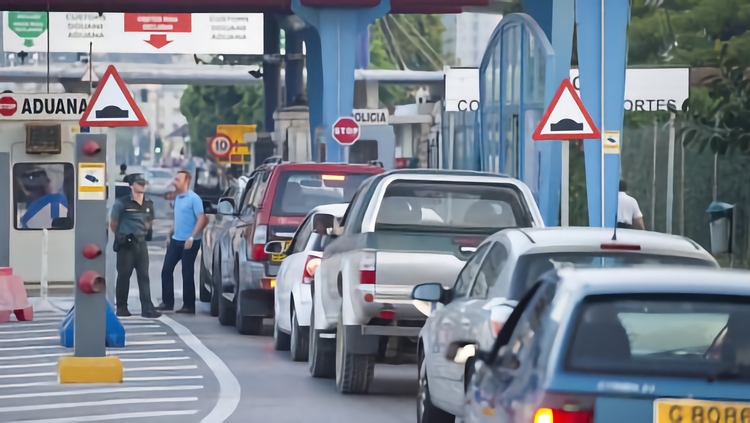Eduardo González
Spaniards feel more European than the French and, although both countries support EU involvement in Ukraine, Spaniards value European investment in defense less, according to the Spain-France report. Crossed views on European challenges, presented yesterday in Madrid and which also reveals that the citizens of the two countries currently have a much more positive perception of each other than in the past.
According to the report, drawn up by the Elcano Royal Institute and the Spanish-French Friendship Dialogue Association through surveys in both countries, the “feeling of European identity among Spaniards is stronger than among the French.” “Spaniards feel almost as European as Spaniards, while the French feel more French than European,” said Carmen González Enríquez, senior researcher at the Elcano Royal Institute and author of the survey, during the event, held at the Uría Menéndez Assembly Hall.
According to the study, two thirds of Spaniards (67%) consider their country’s membership of the European Union to be positive, compared to 42% of French people who think the same. In line with their greater identification with the EU, Spaniards are much more in favor than the French of increasing the competences of the Union, a position defended by a third of Spaniards compared with a fifth of the French. Likewise, although Germany is, for the French and the Spanish, the first preferred country as an ally within the European Union, “both the Spanish and the French choose each other as their second preferred ally, after Germany,” the survey continues.
As expected, the war in Ukraine is seen as the main problem of the European Union by the French and Spanish, but in a different way, as for the Spanish this conflict “seems to overshadow any other”, while the French divide their attention between different challenges, especially climate change, which “is, for the French, almost as important as the war”, the report continues.
Regarding the war, Spaniards and French share sympathy for the Ukrainian cause in its defense against the Russian invasion and “a large majority in both countries” – although “much more favorable in Spain”, according to the researcher – support European involvement in the conflict (85% in Spain and 76% in France), including the sending of military aid (63% of the French, 68% of the Spanish).
As for the outcome of the war, two-thirds of Spaniards (66%) believe that Russia will eventually win the war (although “without specifying what exactly that means,” Carmen Gonzalez pointed out), while French opinion is split almost down the middle on the prognosis of the winner. “But even among those who believe that Russia will win the war, the vast majority are in favor of Europe continuing to support Ukraine,” the document adds. In any case, the report reveals that, despite the concern about the war in Ukraine, “Spaniards value European investment in defense and armaments much less than the French” (the French give it 6.6 points out of ten in terms of importance and the Spanish 5.7, below areas such as renewable energies or digital innovation).
On the other hand, the report shows that the positions of French and Spanish regarding immigration and refuge “are very different”, since Spaniards show a “greater acceptance of both economic immigration (specifically from Africa) and asylum (from the Middle East, 66% of Spaniards compared to 38% of French)”. This difference is even evident in the case of Ukrainian refugees, since, although in both countries the attitude is mostly welcoming, it is much more widespread in Spain (87% of Spaniards compared to 68% of French).
Mutual images
One of the most outstanding chapters of the report concerns the mutual images of French and Spanish people. The results of this survey, like those conducted in 2008 and 2013, reflect Spain’s admiration for France. “France has been for centuries the most influential country in Spain in all relevant aspects: cultural, economic, administrative, legal, political,” it indicates. On the other hand, “from France Spain was looked at with a certain condescension, with sympathy and attraction, but with a feeling of superiority”. However, according to Carmen González, the changes that Spain has undergone in recent decades have generated “a decrease in the Spanish sense of inferiority and the French sense of superiority”.
In any case, what makes the two countries equal today is that “Spaniards and French agree that France is superior to Spain in most important aspects: its economic system (72% French, 88% Spanish), its international influence (87% French, 88% Spanish), its scientific and technical level (87% French, 68% Spanish) and its democratic quality (67% French, 58% Spanish). On the other hand, there is no consensus on two other aspects, such as the quality of cultural production and quality of life, in which “Spaniards feel superior”, while the French are divided as to which country has the better quality of life.
Likewise, the French and Spaniards give each other good marks in all the aspects that are assessed. The main difference lies in the evaluation of the other’s friendliness: the French consider the Spaniards to be nice, but the Spanish fail the French in this aspect. This assessment, in the case of the French, is conditioned by the high number of tourists traveling to Spain. “Seventy-five percent of French people have visited Spain, and have done so several times, and this has allowed them to appreciate the quality of Spanish infrastructures, which they would not know if they did not visit the country,” explained the author.
As for the coincidence of interests between the two countries, the report indicates that the fight against terrorism is considered by the French and Spanish as the priority aspect of collaboration between the two countries. A striking aspect of the report is that 45% of Spaniards and 59% of French people “do not remember any aspect in which both countries have opposing interests”, except in what is related to the trade of agricultural products.
“Spain, fashionable in France”
During the event, Stephane Vojetta, MP for the French in Spain, Portugal, Andorra and Monaco in the French National Assembly (for the party of President Emmanuel Macron), assured that, in the twenty years he has been living in Spain, the perception between the two countries “has changed radically”.
“There is a lot of talk about Spain in the National Assembly and the references are positive,” he assured. “Spain is seen as a reference in France in areas such as the ability to fight crises, fight against male violence or vaccination during the pandemic, with a discipline and faith in science that we have missed in France,” he continued. All this “has contributed to improve the image of Spain in France”, in such a way that “Spain is the fashionable country in France and everybody talks about Spain in very favorable terms, sometimes even distorting reality”.
On the other hand, according to Vojetta, the recent agreement between the governments of Spain, France and Portugal to launch the BarMar maritime gas pipeline, after the discrepancies regarding the previous MidCat trans-Pyrenean pipeline, is “an example of what can be done” when two countries make an effort to “explain themselves better and draw conclusions more appropriate to the medium-term challenges”. France had made its opposition to MidCat clear, but “the Spanish are our neighbors, we owed them more than just saying no, we owed them an alternative,” said the MP.







